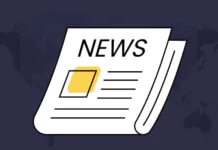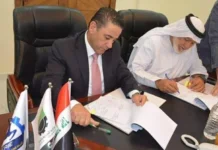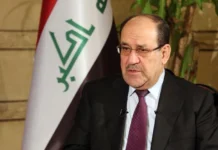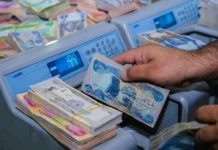A British Report Reveals The Need To Modernize The Banking System In Iraq
Economy | 10/23/2025 Mawazine News – Baghdad The English-language magazine “Global Finance” revealed that economic diversification in Iraq is limited, considering that modernizing the “backward” banking system is a priority for the country.
The magazine stated in a report on the performance of central banks in the Middle East that “Iraq’s GDP growth is expected to recover in 2025 after two consecutive years of recession, driven primarily by a recovery in oil production,” noting that “the economy remains heavily dependent on hydrocarbons, which constitute 95% of government revenues, making it vulnerable to fluctuations in global oil prices.”
It added that “although economic diversification has been on the agenda for a long time, real progress has been limited. In response, the Central Bank of Iraq is promoting what it describes as “developmental central banking,” focusing on directing credit toward strategic sectors, such as agriculture and industry, to expand the country’s economic base.”
The report explained that “modernizing Iraq’s backward banking system is another priority. Reforms are underway in state-owned banks, alongside initiatives aimed at reducing the use of cash.”
In May 2024, new regulations were issued for digital banks and electronic payment companies, prompting several new players to enter the market.
According to the report, “Despite efforts to combat money laundering and terrorist financing, the Central Bank still faces severe compliance challenges, and many Iraqi banks remain restricted to dollar transactions due to concerns about illicit financial flows to sanctioned entities.”
The magazine noted in its report that “in early 2025, authorities uncovered a new scheme involving Visa and Mastercard prepaid products used to transfer funds to Iranian-backed militias. In response, the Central Bank of Iraq set a monthly cross-border transfer cap of $300 million and capped individual cardholder transactions at $5,000.”
https://www.mawazin.net/Details.aspx?jimare=268978
Government Advisor: Iraq’s Foreign Exchange Reserves Exceed $100 Billion
Economy | 04:48 – 10/23/2025 Mawazine News – Baghdad – The Prime Minister’s financial advisor, Mazhar Mohammed Salih, confirmed that Iraq’s external debt is at its lowest levels compared to many neighboring countries.
Salih said in a statement to the official agency that “the general indicators of the Iraqi economy have witnessed improvement over the past two years, thanks to a number of interconnected factors, the most important of which is the relative stability in oil revenues at acceptable levels, which provided a stable funding base for the general budget, and improved management of public spending by re-prioritizing reconstruction and infrastructure projects, and focusing on the service and production sectors within the government program.”
He added, “This came in addition to activating the financial and administrative reform tools launched by the Central Bank and the Ministry of Finance, whether through electronic payment systems, expanding the network of non-oil revenues, or controlling border crossings and customs through automation, in addition to stabilizing the exchange rate and controlling inflation within globally acceptable limits, which strengthened monetary and financial confidence in the national economy.”
He continued, “The Prime Minister’s assertion that the financial and economic situation is at its best reflects a significant improvement in the management of the financial cycle, and is a solid prelude to comprehensive structural improvement.
” He explained that “the national economy has demonstrated its ability to efficiently and transparently utilize its resources, and looks forward to establishing a sustainable development economy on solid foundations, particularly within the framework of the Development Road project.”
He pointed out that, with regard to the decline in the fiscal deficit to 34 trillion dinars, this decline represents a noticeable shift from the annual deficit levels that were estimated between (60-64) trillion dinars annually.
He pointed out that “the current government’s total government debt did not exceed (34) trillion dinars during the past three years, as a result of gradual fiscal policies that can be summarized in three main mechanisms, the most important of which are:
increasing non-oil revenues by improving tax and customs collection through automation and preventing financial evasion, enhancing the capacity to collect fees for government and municipal services, controlling waste in public institutions, improving collection efficiency, rationalizing public spending by rationing unnecessary operating spending, setting priorities for initiating investment projects of productive and service importance, adopting the principle of “daily cash management” in spending, to reduce short-term debts, and enhancing internal liquidity by increasing reliance on internal borrowing when needed through local debt instruments (bonds, treasury transfers) instead of external financing.”
He explained that “this was accompanied by an increase in the Central Bank’s foreign currency reserves, which provided space Greater government finances through the dinar window, in addition to increased coordination between fiscal and monetary policy, ensuring sustainable financing without inflationary pressures.”
He stressed that “the reduction in the estimated deficit rates in General Budget Law No. (13) of 2023 (the three-year budget) was not only due to a significant increase in oil revenues, but also as a result of gradual reform in public finance management and improving cash flows between institutions.”
He continued, “The reading of the external debt in the Prime Minister’s speech was technical and analytical, as the external debt did not exceed $13 billion, which is a very low level compared to many countries, including neighboring countries. This reflects that the external debt burden on Iraqi finances is limited, and that the structure of public debt is more inward-looking (in dinars) than outward-looking (in dollars).”
Saleh concluded by saying, “The frequent talk about the risk of external debt is often used in political or electoral contexts and does not reflect the true financial situation, especially since Iraq possesses foreign exchange reserves exceeding $100 billion at the Central Bank of Iraq, which cover the external debt many times over in terms of the internationally recognized foreign exchange reserve efficiency indicators.” https://www.mawazin.net/Details.aspx?jimare=268983
For current and reliable Iraqi news please visit: https://www.bondladyscorner.com







